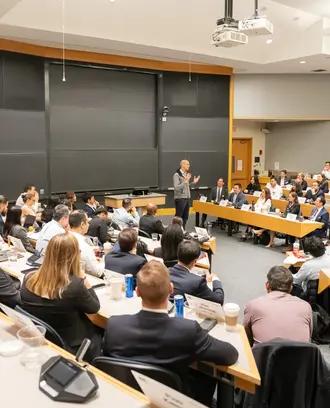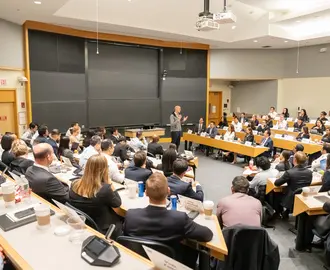Almost 15 years ago, with little-to-no business experience, Mike Swartz, EMBA ‘23, and two friends launched a firm focused on designing and building digital experiences for clients, using skills they learned working in newsrooms. In 2022, as Swartz was working his way through the first year of the MIT Executive MBA, he was approached with an offer to acquire the growing company, Upstatement. Not only did MIT Sloan give him the essential business background he was missing, but also enabled him to apply it in real time as he navigated the acquisition.
“What I learned in class on Friday,” Swartz says, “I put into practice on Monday morning.”
After running Upstatement successfully for more than 14 years, why did you think you needed an MBA?
Mike Swartz, EMBA ’23
It’s a good question, and part of me was on the fence about going back. It’s a big commitment, and I knew it was going to be a lot of work. So, there was a part of me that said, You’ve started and run this company for this long, why bother with it? But I’m glad I didn’t listen to that voice, because the program has filled in some essential gaps I just couldn’t get from my network, my intuition, or self-directed study. I went to art school initially, and ultimately completed my degree in computer science, but was totally self-taught when it came to strategy, accounting, finance, and more.
I came to MIT to try to become better at running Upstatement, because our employees and clients deserve well-trained leadership. I couldn’t have guessed how useful this training would be in the short run as we made big decisions about our future.
As someone with a background in computer science and design, what has been the biggest challenge for you in an MBA program? Is there anything that surprised you about the experience?
I think I expected to be a bit behind the rest of the class. Everyone in the program is so impressive and has so much experience that it’s easy to feel like an imposter—we have many experienced physicians, lawyers, bankers, government officials, and founders in our ranks. I’m a self-taught entrepreneur who isn’t afraid to admit I’ve Googled terms like ‘business plan’ a few times over the years.
But I’ve been pleasantly surprised by how well the material is taught, how attentive and supportive the TAs are, and especially how much I’ve learned from my classmates. Everyone is extremely supportive and willing to share their knowledge, and the group projects show that everyone has something to bring to the table. I’ve heard that some MBA programs can be quite cutthroat, but I’ve seen nothing but love and support inside our cohort. I’m really glad I chose this type of program and this time in my life.
You sold your company in the middle of your EMBA program. A bold move! How did you make the decision to sell? What did you learn in your classes or from your peers at MIT Sloan that helped you navigate the process?
A bold move indeed! We’ve been on a journey to keep building our capabilities, influence, and profile over the last 14 years, and joining the kyu Collective was the next logical step on our journey. A subsidiary of the Japanese company Hakuhodo DY, kyu is a unique organization. It is small and own firms we idolize, like IDEO, SYLVAIN, Godfrey Dadich Partners, and SY Partners—it’s the only buyer we considered. We’re a design-led brand and product consultancy, so our focus on craft and culture is really important to us. Teaming up with kyu and our strategic alliance with Godfrey Dadich Partners gives us the opportunity to grow our client base and influence, learn more as leaders, and gain access to projects we could never dream of before, all without sacrificing our values or all that we’ve built.
The MIT EMBA curriculum so far has had an uncanny parallel to the issues I’ve been exposed to as we decided to move forward with this deal. Accounting gave me new confidence in our model and the choices we’ve made in our books, which was important as we went through the diligence process. Competitive Strategy helped me analyze our market and the position this deal would strengthen for us, and helped me analyze it within the context of our existing strategy and from our new partner’s perspective. The classes in leadership helped me prepare for what’s next: moving from a founder with almost no accountability (we were bootstrapped with no outside investment) to managing our team, our board, and our new corporate partners in Japan.
And even more specifically, I learned how to value companies under different scenarios, so I could follow our advisors closely and understand the logic of the deal. We even used a Monte Carlo simulation to analyze the probable outcomes of some of the deal’s incentives. Thanks, Data, Models, and Decisions (DMD)!
I’ve also gotten great advice from colleagues in my cohort—–friends who work the ‘buy’ side of these deals—who helped me put this in context. I never would’ve had that perspective without being here at Sloan.
You’re still a student, slated to graduate in May 2023. How do you think the MIT Sloan experience will benefit you as you move forward and continue your role as Upstatement’s CEO?
Beyond everything I named above, I’ve gained a great network of support from my classmates, as well as the connections I’ve made with professors. Now if I’m looking for advice or have a problem, I’ve got an incredible network to call on.
What’s the most important takeaway from your EMBA experience so far?
Beyond the theory, tactics, and specific information, I’ve loved stretching myself to learn new things and meet new people. Never stop learning or trying new things—it’s always worth it.
Upstatement is a company that specializes in storytelling. If you had to write your own story thus far in only six words, what would it be?
I’m grateful for the incredible journey.



